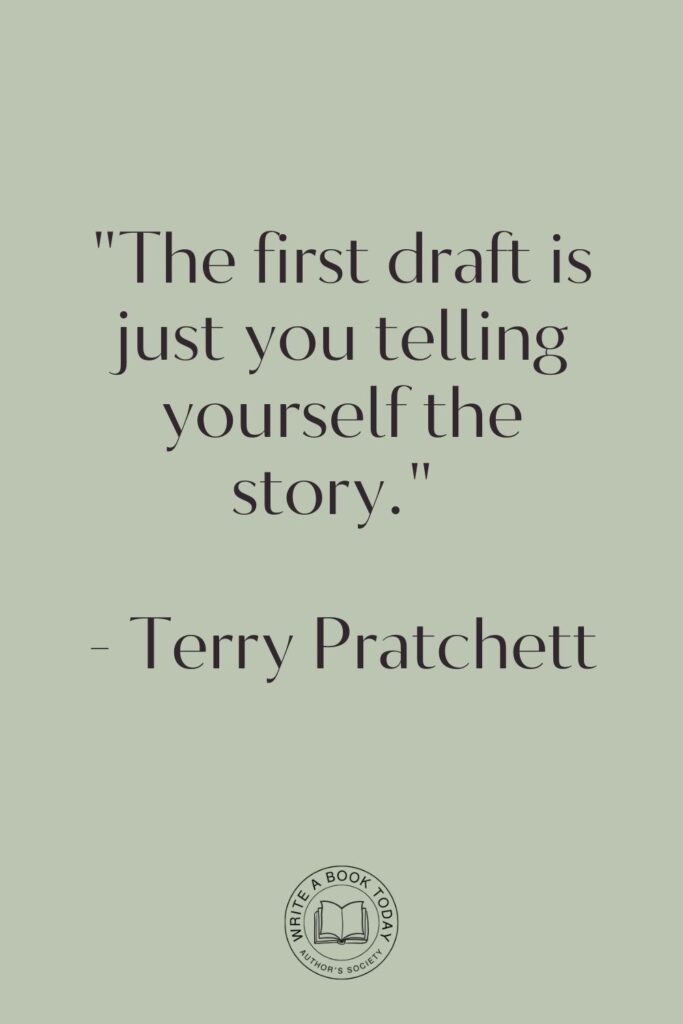Have you ever found yourself staring at a blank page, feeling like your creativity has packed its bags and left town? You’re not alone. Writer’s block is a common foe for many, lurking in the shadows of our minds, waiting to pounce when we least expect it.
But fear not, for this post is here to illuminate the path back to your creative haven. By exploring these ten proven strategies, you’ll find yourself equipped with the tools to banish that pesky block and let your words flow freely once more.
Understanding Writer’s Block
Before diving into solutions, it’s essential to grasp what writer’s block truly is. This notorious creativity killer can strike anyone, from seasoned authors to budding scribes. But understanding its nature can be the first step toward conquering it.
Google Docs is for notes. Scrivener is for novels. Upgrade your writing game and try it for free today!

What is Writer’s Block?
Writer’s block is more than just a fleeting moment of doubt. It’s an insidious condition that stifles creativity, leaving even the most eloquent wordsmiths at a loss for words. Imagine trying to catch a butterfly with a net full of holes—frustrating, right? That’s what attempting to write with writer’s block feels like.
It can manifest as a lack of inspiration, overwhelming self-doubt, or even a paralyzing fear of failure. These feelings often lead to procrastination, turning what was once a joyful activity into a daunting task.
One of the main culprits behind writer’s block is the pressure to produce perfection. The blank page becomes a canvas of judgment, where every word seems scrutinized by an invisible critic. This mental barricade can be incredibly difficult to dismantle, but acknowledging its presence is a vital first step.
Common Causes of Feeling Stuck
Several factors contribute to the sensation of being stuck. Stress, fatigue, and external distractions often play significant roles. When life throws curveballs, it can be challenging to muster the energy or focus required to write.
Moreover, a lack of direction or clarity about one’s writing goals can also lead to stagnation. Without a roadmap, the journey becomes aimless, causing creativity to wander off course.
Another common cause is self-imposed pressure. Writers frequently set unrealistic expectations, demanding brilliance from themselves at every turn.
This pressure creates an environment where mistakes are feared rather than embraced as learning opportunities. As a result, the creative process becomes stifled, and inspiration dwindles.
Proven Strategies for Overcoming Writer’s Block
Having unraveled the mystery of writer’s block, it’s time to delve into strategies that can help reignite your creative spark. Each method offers a unique approach, allowing you to find the perfect fit for your writing style and personal preferences.

1. Embrace Free Writing
Free writing is a liberating exercise that encourages you to put pen to paper without overthinking. It’s about letting your thoughts flow unfiltered, capturing whatever comes to mind.
Set a timer for ten minutes and write continuously until it rings. Don’t worry about grammar, punctuation, or coherence. Just write. This practice helps silence the inner critic and unlocks hidden ideas buried beneath layers of doubt.
Set aside a specific time each day for free writing. Consistency is key, as regular practice trains your brain to tap into creativity on demand. Over time, you’ll notice a shift in how easily ideas come to you, making the writing process less daunting and more enjoyable.
2. Change Your Environment
A change of scenery can do wonders for your creative juices. If you’ve been staring at the same four walls for hours on end, it’s time to shake things up. Head to a park, a café, or even a different room in your house.
The new environment can provide fresh perspectives and inspiration. Sometimes, all it takes is a different view to spark new ideas.
Consider rearranging your writing space to infuse it with elements that inspire you. A plant, a piece of art, or even a new desk lamp can create an inviting atmosphere conducive to creativity. By altering your surroundings, you signal to your brain that it’s time to think differently.
3. Set Small, Achievable Goals
Breaking down your writing project into smaller, manageable tasks can alleviate the overwhelming feeling of tackling a massive undertaking.
Instead of aiming to complete an entire chapter, focus on writing a single paragraph or page. These bite-sized goals are less intimidating and allow you to build momentum gradually.
Creating a checklist of these mini-goals can be particularly motivating. As you tick off each item, you’ll experience a sense of accomplishment, boosting your confidence and motivation to continue. Remember, even the longest novels are written one word at a time.
Feeling lost with your debut novel?
Fiverr Pro connects you with expert editors, designers, and marketers – everything you need to get your book ready for success!

4. Try Creative Exercises
Engaging in creative exercises can help loosen the grip of writer’s block. These activities are designed to stimulate your imagination and coax out new ideas.
Try drawing, painting, or even dancing to a favorite tune. These exercises aren’t about creating masterpieces but about freeing your mind from the constraints of logic and order.
Writing exercises, such as crafting a story from a random prompt or rewriting a favorite scene from a book, can also reignite your passion for storytelling. These activities remind you of the joy found in creativity and offer a refreshing break from structured writing.
Incorporate creative exercises into your daily routine. Start your writing session with a quick five-minute exercise to warm up your brain. This practice will help transition your mind from everyday concerns to the realm of creativity, making it easier to dive into your writing projects.
5. Seek Inspiration from Others
Sometimes, the spark of creativity comes from witnessing the brilliance of others.
Reading works by your favorite authors, watching inspiring movies, or listening to captivating music can ignite your imagination. These experiences remind us of the beauty and power of storytelling, reigniting our desire to contribute our own voice to the world.
Consider attending writing workshops or lectures by authors you admire. These events offer insight into their creative processes and can provide invaluable motivation to continue your own writing journey.
Surrounding yourself with creativity can help rekindle your passion and remind you why you started writing in the first place.

6. Take Breaks and Practice Self-Care
It’s easy to fall into the trap of pushing through writer’s block, but sometimes the best solution is to step away. Taking regular breaks allows your mind to rest and recharge.
Engage in activities that bring you joy, whether it’s going for a walk, practicing yoga, or spending time with loved ones. These moments of self-care replenish your energy and can lead to unexpected bursts of inspiration.
Schedule regular breaks into your writing routine. Set a timer to remind yourself to step away from your desk every hour. Use this time to stretch, hydrate, or simply clear your mind. Returning to your work with a refreshed perspective can lead to new ideas and solutions.
7. Use Writing Prompts
Writing prompts are a fantastic tool for overcoming writer’s block. They provide a starting point, freeing you from the pressure of coming up with ideas from scratch.
Choose a prompt that resonates with you and let it guide your writing. The goal isn’t to produce a polished piece but to kickstart your creativity and get words flowing.
Prompts can range from simple scenarios to complex themes. Experiment with different types to discover what sparks your imagination. You’ll often find that the act of writing, regardless of the prompt, leads to unexpected insights and inspiration.
8. Join a Writing Group
Writing doesn’t have to be a solitary endeavor. Joining a writing group can provide a supportive community of fellow writers who understand the struggles of overcoming writer’s block.
These groups offer opportunities to share work, receive feedback, and gain new perspectives. The camaraderie found in these communities can be a powerful motivator to keep writing.
Participating in group writing exercises or challenges can also push you out of your comfort zone, encouraging growth and experimentation. The shared experiences within a writing group remind you that you’re not alone in your creative journey.
9. Read Widely and Diversely
Reading is a wellspring of inspiration for writers. By exposing yourself to a wide range of genres, styles, and voices, you expand your creative horizons.
Each book offers a new perspective, providing insights into different cultures, emotions, and experiences. This diversity enriches your writing, helping you craft more authentic and compelling stories.
Challenge yourself to read outside your comfort zone. Explore genres you’ve never considered or authors from different backgrounds. These literary adventures can introduce you to fresh ideas and techniques, sparking new inspiration for your writing projects.
10. Reflect on Your Writing Journey
Take a moment to reflect on your writing journey. Consider how far you’ve come and the obstacles you’ve overcome. This reflection can provide valuable insights into your creative process and remind you of your passion for writing.
Celebrate your achievements, no matter how small, and use them as fuel to continue your journey.
Journaling about your writing experiences can be a therapeutic exercise. It allows you to express your thoughts and emotions, helping you identify patterns or triggers that contribute to writer’s block. This self-awareness empowers you to take proactive steps toward overcoming obstacles.
Motivation to Write Again
Finding the motivation to write again is a crucial step in overcoming writer’s block. By reconnecting with your passion and building a supportive network, you can reignite your love for writing and find the strength to persevere.

Finding Your Passion for Writing
Rekindling your passion for writing begins with understanding why you started in the first place.
Reflect on the moments that inspired you to pick up the pen and the stories that moved you to tears or laughter. These memories are powerful motivators, reminding you of the joy found in storytelling.
Consider setting aside time to write for yourself, free from external expectations or deadlines. Allow yourself to explore topics that genuinely interest you, even if they’re unrelated to your current projects. This freedom can reignite your enthusiasm and remind you of the intrinsic rewards of writing.
Building a Supportive Writing Community
Surrounding yourself with a supportive writing community can provide the encouragement and motivation needed to overcome writer’s block. Whether through online forums, local writing groups, or social media, connecting with fellow writers creates a sense of belonging.
Sharing experiences, challenges, and triumphs fosters a collaborative environment where creativity thrives.
Engage actively with your writing community by offering feedback, participating in discussions, and celebrating each other’s successes. This mutual support strengthens your resolve and reminds you that you’re not alone in your creative journey.
No marketing platform? No social following? No problem!
Publisher Rocket helps you market your debut novel like a pro.
It’s a gamechanger for debut authors – try it today!


Inspiring Stories from Famous Writers
The journey of writing is filled with ups and downs, and even the greatest writers have faced challenges along the way. Their stories of perseverance and resilience can serve as a source of inspiration and hope.
Overcoming Challenges: Lessons from the Greats
Many famous writers have battled writer’s block, yet their determination led them to create masterpieces. For instance, J.K. Rowling faced numerous rejections before Harry Potter found its way to readers’ hearts. Her story reminds us that setbacks are not the end but stepping stones toward success.
Stephen King, known for his prolific writing, also struggled with self-doubt and creative slumps. He emphasizes the importance of persistence and discipline, often stating that “the scariest moment is always just before you start.”
These anecdotes illustrate that even the most accomplished writers encounter obstacles, but their unwavering dedication propels them forward.

Quotes to Inspire Your Writing Journey
Words of wisdom from literary giants can provide the motivation needed to push through writer’s block. Consider these quotes:
- Ernest Hemingway: “The first draft of anything is sh*t.” This reminder encourages writers to embrace imperfection and focus on progress rather than perfection.
- Maya Angelou: “You can’t use up creativity. The more you use, the more you have.” This quote reassures us that creativity is an abundant resource, always waiting to be tapped into.
- Ray Bradbury: “You fail only if you stop writing.” This sentiment emphasizes the importance of perseverance, urging writers to keep going despite challenges.
Your Path to Creative Freedom
Embarking on the journey to overcome writer’s block is a transformative experience. By adopting these strategies and fostering a supportive environment, you can unlock your full creative potential and find joy in writing once more.
Creating a Personalized Writing Routine
Establishing a writing routine tailored to your preferences and lifestyle is crucial for overcoming writer’s block. Experiment with different times of day, locations, and writing techniques to discover what works best for you.
Consistency is key, as regular practice builds discipline and familiarity with the creative process.
Consider incorporating rituals that signal the start of your writing session, such as lighting a candle, playing a specific playlist, or enjoying a cup of tea. These cues help transition your mind into writing mode, making it easier to overcome initial resistance.
Staying Committed to Your Craft
Commitment to your craft requires dedication and resilience. Remind yourself of your goals and aspirations, and use them as motivation to push through challenging moments. Remember that writer’s block is a temporary hurdle, not an insurmountable wall.
Celebrate your progress, no matter how small, and acknowledge the effort you put into your writing journey. By staying committed, you’ll find that overcoming writer’s block becomes a natural part of your creative evolution.
In conclusion, overcoming writer’s block is a journey that requires patience, perseverance, and a willingness to explore new approaches. By implementing these strategies and embracing the support of your writing community, you’ll find yourself empowered to conquer any creative challenge.
Remember, the world is waiting to hear your unique voice, so pick up your pen and let your words soar.








